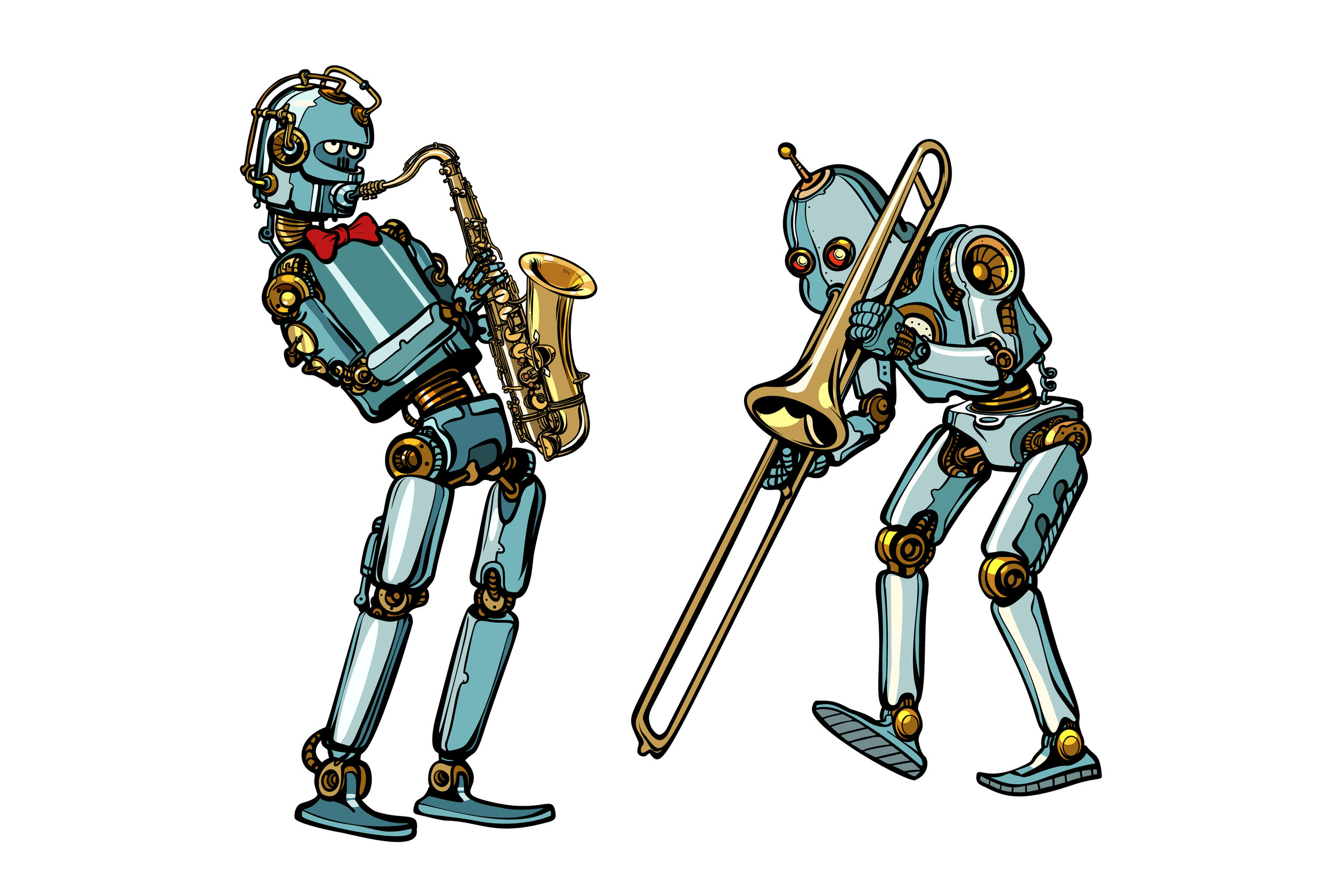Embracing New Technology
In a recent segment on National Public Radio, journalist Priska Neely covered a robot band called Compressorhead, billed as “world’s heaviest metal band.” [1] The robots recently performed at the Australian festival Big Day Out. The band is programmed to play cover songs by Led Zeppelin, AC/DC, and other classic rock and early metal bands. Neely also talked with Troy Rogers, who runs Expressive Machines Musical Instruments (or EMMI), a group dedicated to designing robots that can improvise music. Also recently, musicians such as Björk and Pat Metheny have been working with robot musicians. [2]
Neely asks, “Robots can scan endless pages of music and can be programmed with the rules of a genre. If they can play faster and even tour, will there come a time when human musicians are replaced altogether?” She ultimately argues, along with Troy Rogers, that the goal is to collaborate with these robots, rather than be replaced by them. However, the fears that she expresses are not unjustified. In the present day, synthesizers are often used to replace entire string sections on recordings and on stage, and Broadway theaters are increasingly using computer-generated music to replace musicians in orchestras as a cost-cutting measure.
I listened to Compressorhead [3] and found its sound to be rather, well, mechanical. This is to be expected. However, when MIDI (musical instrument digital interface), a computer language that enables computers and instruments to communicate, first rose to popularity the sounds that it created were very synthetic. That situation has improved greatly over time. Today, the average PC or MAC equipped with the right software can create symphonic music that sounds remarkably authentic. To my ear, there are still subtle differences between these recordings and the real McCoy, but I’m sure that it is only a matter of time before those differences become imperceptible. I wonder if musicians should be embracing technology that may ultimately fuel our demise.
On the other hand, resistance to technological advancement can often lead to failure. The case of Napster is instructive. When Napster (one of the original internet file-sharing services for music) became popular the Recording Industry Association of America (RIAA) reacted very strongly. They viewed the unpaid sharing of mp3 and other audio files as a violation of copyright law (and it was). Nevertheless, the judicial and legislative branches of our government are slow and lumbering beasts. By the time the RIAA could put a stop to Napster (though they ultimately did), a significant portion of the industry’s marketshare had moved online. While the RIAA was busy in court, Apple computers was busy developing iTunes. As the current ubiquity of that computer application demonstrates, Apple made the much wiser choice to embrace new technology. Music on the internet was the future and they knew it. The genie was not going back in the bottle, no matter what the eventual outcomes in the courts or in Congress.
History may look back on Pat Metheny and Björk and view them as visionaries when it comes to robot musicians. They are certainly embracing new technology. They, like the early users of synthesizers and computers, have succeeded in creating new and exciting sounds that could not be created by human beings. Creating new sounds is a composer’s calling and they are clearly answering the call. However, there is no disputing the fact that many musicians have lost work because of synthesizers and MIDI. And, it is very likely that more musicians will lose work to robots some day in the future.
There is a large and important question that we should stop to ask before we forge ahead into this new frontier: What do we want from our computers, robots, or other devices? I think most people would answer that they want these things to make our lives easier and more productive. We want our lives to be more productive so that we can work less and thus have more time to do things that we enjoy or find fulfilling. For many, making music (or any other kind of art) is that very thing we would choose to do with that extra time. I can completely understand the impetus to invent robots to do our work for us. But do we want to invent them to do our art, too? John Adams once said “I must study politics and war, that our sons may have liberty to study mathematics and philosophy. Our sons ought to study mathematics and philosophy, geography, natural history and naval architecture, navigation, commerce and agriculture in order to give their children a right to study painting, poetry, music, architecture, statuary, tapestry and porcelain.” To Adams, the privilege of studying art was the ultimate goal that our forefathers hoped to achieve by their efforts. If I’m reading Adams correctly, he is claiming it as nothing less than the goal of our society. It seems that, if we invent enough robots, computers, and handheld devices, all we will have achieved is the privilege of doing nothing at all.
1. Listen to the segment here: http://www.npr.org/blogs/alltechconsidered/2013/09/14/216482747/musical-robots-take-the-stage-for-harmony-not-domination
2. For more information on Björk’s robot collaborations, see http://blog.ted.com/2012/12/10/ted-fellow-helped-bjork-create-30-foot-harp-for-biophilia-tour/; for Pat Metheny’s, see http://www.cbsnews.com/video/watch/?id=7361542n.
3. A video of the robots is available on Youtube: http://www.youtube.com/watch?v=3RBSkq-_St8.


